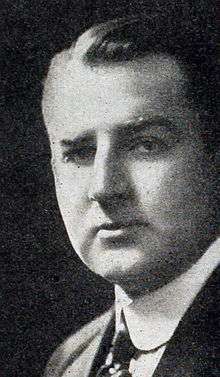Frank Powell
| Frank Powell | |
|---|---|
 | |
| Born | Hamilton, Ontario |
| Occupation | Stage director, film actor, film director |
Frank E. Powell was a stage and silent film actor, screenwriter, and director in the United States. He was born in Hamilton, Ontario, Canada.
Biography
Starting as a stage director for Augustus Thomas, Frank Powell later joined playwright Kirke La Shelle, and afterwards for some years directed productions in Europe for Ellen Terry.[1] He returned to America and made his Broadway theatre debut in 1904 and began his career in film in 1909 as an actor and scriptwriter at Biograph Studios. There, he also co-directed his first film with D.W. Griffith and demonstrated an adeptness at directing Biograph-style comedies.[1]
After directing sixty-three short films for Biograph, Powell returned to Europe in 1914 and joined Pathé Frères as a producer of historical and romantic dramas.[1] Ill health necessitated his resting for a while but he used the opportunity to travel around Europe, studying costumes and types.[1] On his return from Europe, he was engaged by the Powers Motion Picture Company, and after being with them for some time, rejoined Pathé as a director of Special Features.[1] Later he was freelancing, directing the first film made by the George Kleine film production company. Hired by William Fox, he made a number of films for Fox Film Corporation then became part of the World Film Corporation studios.
In 1914, the film The Taint required buying a steam-engine and then destroying it in a staged derailment. The stunt did not go as planned and the train overturned close to the actors who could have been killed. No one was hurt however.[2]
Powell is best remembered for discovering Theda Bara,[3] directing her in A Fool There Was (1915), the film that made her an international star and gave her the nickname "The Vamp". A year earlier, he directed Bara in her onscreen debut, The Stain. He also directed Mary Pickford in sixteen films, as well as other early stars such as Florence Lawrence, Robert Harron, Kate Bruce, Blanche Sweet, Donald Crisp, Henry B. Walthall, and Mabel Normand.
In late 1916 he set up his own production company Frank Powell Productions Inc. One of his films Charity? (1916), billed as a "sociological photo-drama" was a purported exposé of appalling conditions in New York orphanages. After being screened to a private audience who were appalled at the exaggerations in it, the studio decided to make changes. At the time, the Governor of New York, Charles S. Whitman, had commissioned a report on the conditions in private child-caring institutions and the film would seem to have been an opportunity to cash in on public concern.[4]
In the early 1920s, Powell wrote a number of scripts for British films. Powell directed his last film for Mack Sennett Comedies in 1921.
Selected filmography

Director
- The Kid (1910)
- Jane Shore (1911)
- Puppets of Fate (1912)
- His Last Dollar (1914)
- Officer 666 (1914)
- The Stain (1914)
- The Taint (1914)
- Children of the Ghetto (1915)
- The Devil's Daughter (1915)
- A Fool There Was (1915)
- From the Valley of the Missing (1915)
- Princess Romanoff (1915)
- A Woman's Past (1915)
- Charity? (1916)
- The Chain Invisible (1916)
- The Fourth Estate (1916)
- The Scarlet Oath (1916)
- The Witch (1916)
- Mary Moreland (1917)
- The Dazzling Miss Davison (1917)
- The Final Payment (1917)
- The Mirror (1917)
- Hedda Gabler (1917)
- The Debt (1917)
- Mrs. Balfame (1917)
- Motherhood (1917)
- Heart of the Sunset (1918)
- You Never Know Your Luck (1919)
- The Unbroken Promise (1919)
- The Forfeit (1919)
Screenwriter
- Everybody's Business (1917)
- Enchantment (1920)
- A Soul's Awakening (1922)
See also
References
- 1 2 3 4 5 Robert Grau (1914) The Theatre of Science, The Broadway Publishing Company
- ↑ Popular Electricity and Modern Mechanics Vol.29 No.1 (July 1914) Modern Publishing Co.
- ↑ Daniel Talbot (1975) Film: An Anthology, University of California Press
- ↑ The Survey Vol.37 (1917), Survey Associates Inc., New York
External links
| Wikimedia Commons has media related to Frank Powell. |